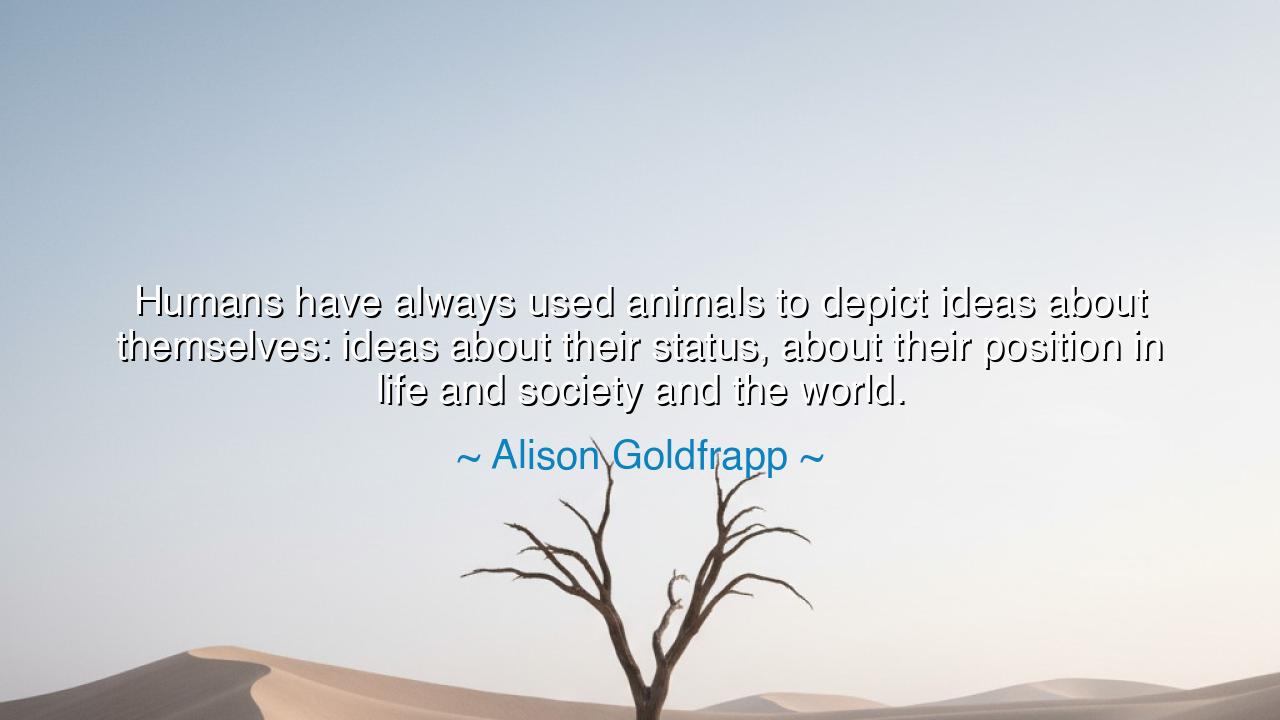
Humans have always used animals to depict ideas about themselves:
Humans have always used animals to depict ideas about themselves: ideas about their status, about their position in life and society and the world.






Hear the words of Alison Goldfrapp, who spoke with the voice of one who has peered into the soul of symbols: “Humans have always used animals to depict ideas about themselves: ideas about their status, about their position in life and society and the world.” This is no passing observation, but a timeless truth. For from the dawn of memory, man has looked upon the creatures of earth, sky, and sea, and in them found mirrors of his own being. In the lion, he saw majesty; in the serpent, cunning; in the dove, innocence. Through these animals, humanity clothed its deepest truths, fears, and longings in flesh not its own.
The origin of this saying is rooted in the long lineage of art and myth. Alison Goldfrapp, a creator of music and visual beauty, drew upon the ancient practice of using animals as vessels of meaning. Her words remind us that humanity’s relationship with beasts has never been only practical—for food, for labor, for survival—but also profoundly spiritual and symbolic. The eagle upon the standard, the dragon in the tale, the stag in the forest vision—each creature became a language through which humans told themselves who they were, where they belonged, and how they dreamed of transcending their limits.
The ancients themselves carved this wisdom into their myths. Egypt revered the falcon-headed Horus, symbol of divine kingship, for in the bird’s flight they saw the eye of heaven surveying the earth. The bull was worshiped as a sign of strength and fertility, its power tied to the cycles of life itself. These depictions were not mere ornaments but revelations: the people did not simply see animals, but saw themselves, their status in the cosmos, their hopes of eternity, their fears of death. In every beast, a message about mankind.
History also tells us of the medieval heraldry of Europe, where families inscribed lions, boars, and stags upon their shields. The choice of each beast was deliberate, a declaration of who they claimed to be. A lion meant courage and sovereignty, an owl meant wisdom, a wolf meant ferocity. Thus animals were not only companions or enemies in the wild, but banners under which humans proclaimed their position in life and society. A man might fail to live up to his emblem, but the emblem endured, shaping his family’s identity across generations.
The meaning of Goldfrapp’s words is therefore profound: that humans project their essence into the natural world, weaving themselves into the great web of creation through symbol and story. To see an animal is, in some way, to see ourselves. This practice is both noble and dangerous—for while it allows us to aspire to the courage of the eagle or the patience of the ox, it can also lead us to claim dominion through symbols of power that justify pride and conquest. Yet even in this, the truth remains: our ideas about ourselves are inseparable from the creatures with which we share the earth.
What lesson shall we, who listen to this teaching, take for ourselves? That the creatures around us are not mere ornaments or resources, but mirrors. To reflect upon them is to reflect upon our own soul. Let us look upon the animals with reverence, for in their forms we find not only strength and beauty, but also warnings and truths. To destroy them thoughtlessly is to blind ourselves to parts of our own story; to honor them is to honor the depths of who we are.
Therefore, children of the future, inscribe this wisdom upon your hearts: learn from the creatures you behold. The ant teaches diligence, the wolf loyalty, the horse endurance, the owl wisdom, the lamb gentleness. See in them not only beasts but teachers, companions in the great school of life. In this way, as Goldfrapp has reminded us, you will understand your position in life and society and the world, not as a master apart, but as a participant in the eternal communion of creation. And when you live in this awareness, your life will be richer, and your spirit will walk humbly amidst all beings.






AAdministratorAdministrator
Welcome, honored guests. Please leave a comment, we will respond soon